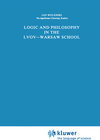
×
![Buchcover ISBN 9789401076661]()
Logic and Philosophy in the Lvov—Warsaw School
von Jan WolenskiInhaltsverzeichnis
- I / The Origin and Development of the Lvov—Warsaw School.
- 1. The Rise of the Lvov—Warsaw School and the Periods in its Development.
- 2. Kazimierz Twardowski and the Lvov Stage.
- 3. The Lvov—Warsaw School Between the World Wars.
- 4. World War II and the Post-1945 Period.
- 5. The Typical Philosopher of the Lvov—Warsaw School.
- Photographs.
- II / Some Philosophical Views of Kazimierz Twardowski.
- 1. Twardowski and the Philosophical Tradition.
- 2. The Conception of Philosophy.
- 3. Psychologism.
- 4. Twardowski on Language.
- 5. Twardowski on Truth.
- 6. Analysis of the Word ‘Nothing’.
- 7. Problems in the Theory of Science.
- 8. Conclusion.
- III / The Conception of Philosophy in the Lvov—Warsaw School.
- 1. ? ukasiewicz.
- 2. Kotarbi? ski.
- 3. Ajdukiewicz.
- 4. Cze? owski.
- 5. Conclusion.
- IV / The Development of Logic in the Lvov—Warsaw School: The Warsaw School of Logic.
- 1. A Concise History of Logic in the Lvov—Warsaw School.
- 2. Sociological Comments on the Warsaw School of Logic.
- 3. General Remarks on the Further Chapters on Logic in the Lvov—Warsaw School.
- V / The Classical Sentential Calculus.
- 1. ? ukasiewicz’s Parenthesis-Free Symbolism and his Criteria of Construction of Logical Systems.
- 2. The Functionally Complete Classical Sentential Calculus — Axiomatic Approaches.
- 3. Partial Sentential Calculi.
- 4. The Sentential Calculus with Variable Functors.
- 5. Ja? kowski’s System of Natural Deduction.
- 6. The Metalogic of the Sentential Calculus.
- 7. Addenda. Concluding Remarks.
- VI / Non-Classical Logics.
- 1. Many-Valued Logics.
- 2. Modal Logic.
- 3. Intuitionistic Logic.
- 4. Ja? kowski’s Discursive Logic.
- 5. Concluding Remarks.
- VII / Le? niewski’s Systems.
- 1. Introduction.
- 2. Intuitive Formalism.
- 3. Semantic Categories and ConstructiveNominalism.
- 4. Some Formal Properties of Le? niewski’s Systems.
- 5. Protothetic.
- 6. Ontology.
- 7. Mereology.
- 8. The Controversy over Le? niewski. Conclusion.
- VIII / Metamathematics, the Foundations of Mathematics and the Semantic Conception of Truth.
- 1. Metamathematics.
- 2. Tarski’s Semantic Theory of Truth. An Introduction.
- 3. The Semantic Theory of Truth. The Formal Aspect.
- 4. The Semantic Theory of Truth. The Philosophical Aspect.
- 5. The General Conception of Semantics.
- IX / History of Logic and Interpretations of Traditional Logic. The Philosophy of Logic and Mathematics.
- 1. History of Logic.
- 2. Interpretations of Traditional Logic.
- 3. The Philosophy of Logic and Mathematics.
- X / Logic, Semantics and Cognition: The Epistemology of Kazimierz Ajdukiewicz.
- 1. The Conception of Meaning.
- 2. Radical Conventionalism.
- 3. Rejection of Radical Conventionalism.
- 4. Toward Radical Empiricism.
- 5. Semantics, Epistemology, Ontology.
- 6. Concluding Remarks.
- XI / Logic, Semantics and the World: The Ontology of Tadeusz Kotarbi? ski.
- 1. Genuine and Apparent Names.
- 2. Ontological Reism: The Basic Thesis.
- 3. The Problem of the Interpretation of the Fundamental Thesis of Reism.
- 4. Pansomatism and Radical Realism.
- 5. Reism and Materialism.
- 6. Why Reism?.
- 7. The Troubles of Reism.
- 8. Concluding Remarks.
- Appendix to Chapters X – XI / Further Epistemological and Ontological Problems Discussed in the Lvov—Warsaw School.
- 1. Scepticism.
- 2. Foundationalism, Fallibilism, Conventionalism, Truth.
- 3. What Exists?.
- 4. The Mind-Body Problem.
- 5. Time, Space, Causality, and Quantum Theory.
- 6. Conclusion.
- XII / The Philosophy of Language.
- 1. Conceptions of Meaning.
- 2. Analytic Sentences.
- 3. Empty Names.
- 4. Concluding Remarks.
- XIII / The Philosophy ofScience.
- 1. Reasoning and Its Modes.
- 2. Induction, Probability, and Justification.
- 3. The General Picture of the Scientific Method and Scientific Theories.
- XIV / Once More History and Beyond.
- 1. The Lvov—Warsaw School and Logical Empiricism.
- 2. The Problem of the Unity of the Lvov—Warsaw School.
- 3. The Lvov—Warsaw School or the Lvov School and the Warsaw School?.
- 4. The Importance of the Lvov—Warsaw School.
- Notes.
- List of the Philosophers of the Lvov—Warsaw School Mentioned in this Book.
- Index of Names.
- Index of Subjects.




